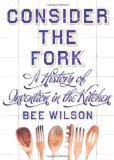Five words from blurb: kitchen, history, invention, human, decisions
Consider the Fork: A History of Invention in the Kitchen is a light, but thoroughly researched look at the way kitchen utensils have changed over the centuries. Taking one object at a time, Bee explains how it first came into use and how its shape and popularity have altered over the years. The book includes everything from the most modern methods of sous-vide cookery, to the ancient art of cooking over a fire; charting the way technology has changed our cookery.
The book is easy to read and packed with little facts that surprised me. I found myself telling friends numerous anecdotes from this book and although nothing in here is really useful, it is the sort of information that any kitchen enthusiast will enjoy.
In the early nineteenth century there was even a brief vogue among ‘fashionables’ for eating soup with a fork. It was soon condemned as ‘foolish’ and the spoon was restored.
The only problem was that there was no narrative drive. Once put down, I could easily forget about this book and had no special urge to pick it up again. It is perfect for dipping into over time, but I found it hard to read in the set three week library lending period (another user had reserved my copy so I had no option to renew it).
The chatty writing style meant this book was very accessible, but after a while I craved more depth. I would have liked some tips to improve my own kitchen skills, but this book was more of a social history. There’s nothing wrong with that – I just prefer books with a greater technical content.
Recommended to anyone with a passion for cookery, especially if you enjoy a lighter writing style.

.


10 replies on “Consider the Fork by Bee Wilson”
Kitchens make great places for history I think always love looking at the old kitchens when visiting old houses ,all the best stu
Stu, I love visiting all kitchens – both old and new 🙂 I think you’d enjoy this one.
I totally get what you are saying about this book. It sounds like a nice light non-fiction read. I have to say I have never really considered the fork.
Jenners, “nice light non-fiction read” Yes. perfect way to describe it. Nothing really wrong with it, but nothing mind blowing either 🙂
Except for your describing this as ‘light’, this actually appeals to me, especially as it is mainly done from a social history aspect. I’ve no particular interest in the subject, but your review reminded me of a delightfully quirky book I read a number of years ago: Akiko Busch’s ‘Geography of Home’ which goes around a house, looking at the social history aspect of each room in turn.
David, I haven’t read ‘Geography of Home’ but it does sound similar to this one. If you ever fancy a lighter read I recommend this one.
This sounds quite random at first, but there must be quite a lot of things to include. Does it focus on western culture only or is it international?
Charlie, This book does include some international objects (for example in the chapter on forks it looks at chopsticks and eating with the hands) but I’d say it has a strong UK/US bias.
You know, this sounds like a more stream-lined Bryson style book. I picked up his book At Home and it drove me nuts with the constant changing of subject and butterfly-like attention span it seemed to expect me to have but the actual trivia about salt cellars and mustard spoons in the kitchen section were very interesting indeed. I shall have to keep an eye out for this. 🙂
Alex, I haven’t read ‘At Home’ but the writing style is similar to the other Bryson books I’ve read. It sounds as though you’ll enjoy this one, although some of the chapters are very short and they might drive you nuts too! Luckily lots of the chapters are long enough to make up for it. Enjoy!